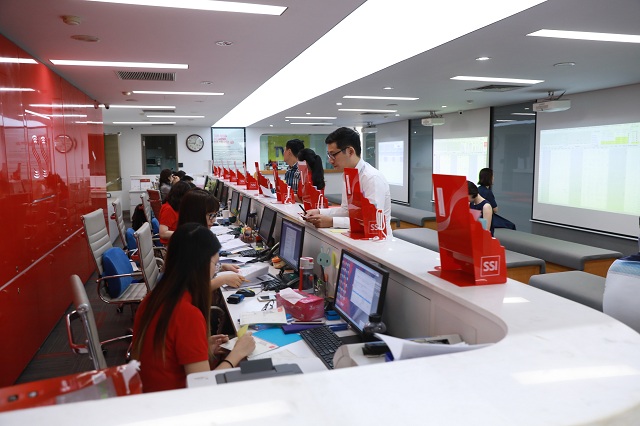HÀ NỘI — Concerns have been raised about tightened margin lending policies by securities firms, but low interest rates and strong buying power from domestic investors may help offset those worries.
Some brokerages last week suspended new margin loans for stocks that had been quite attractive on the market and drawing a great deal of attention. Some companies even announced they would deny all clients’ requests for margin lending.
Tightening margin lending policies is a normal action by securities firms to meet the requirements of auditors when their financial reports are assessed.
As market demand has been increasing, such actions also signalled that margin loans had reached high levels on the market though no brokerages published data because the lending capacity at all companies lies within a limit.
As of the end of the third quarter, total outstanding loans – comprising of margin lending and borrowing – were up 19 per cent quarterly and 33 per cent annually to VNĐ66 trillion, a report by tinnhanhchungkhoan.vn showed.
Normally, tightening loan policies would make the market quiet in the last few months of the year. But market performance in recent weeks could mean the action had hardly had any impact on market sentiment.
It was because some companies had increased their capital and the liquidity of the banking sector had been abundant, providing a huge amount of cash for the stock market.
In addition, investors’ confidence in the market had been higher than ever, which boosted the benchmark VN-Index above 1,080 points last week.
Since December 14, the market trading value on the Ho Chi Minh Stock Exchange (HoSE) had been swinging around VNĐ12-13 trillion each trading day.
Foreign investors had also sought to return to Vietnamese equities, especially Thai investors, through buying in exchange-traded fund (ETF) certificates such as the VFMVN30 ETF.
According to analysts, foreign investors’ rising interest in ETF certificates may help Việt Nam increase its foreign capital in the stock market and balance the buying power of domestic investors.
Đỗ Bảo Ngọc, the deputy CEO of Việt Nam Construction Securities JSC, said market trading value had lifted because new investors turned from bank savings to stock investment and brokerages pumped more cash into the market through margin loans.
Since the Vietnamese stock market bottomed twice this year in late March and late July, the strong purchasing power of domestic investors had been propelling the market growth, he said.
Low-cost monetary policies applied by central banks, including the State Bank of Việt Nam, had driven interest from bank saving to stock purchasing because savings only offered profitability of 1-2 per cent, Ngọc said.
In the short term, the market would benefit from the expectations of COVID-19 vaccine development, which would help boost the global economic recovery and improve investors’ sentiment, he added.
Lê Quang Minh, market analysis director at Mirae Asset Securities Việt Nam, said the VN-Index had reached new highs in each of the last 10 years but then the market would face a short-term correction.
The COVID-19 pandemic had shown no signs of being controlled worldwide and the global economy may continue struggling in 2021, he forecast.
The market’s price-to-earnings per share (P/E) ratio may decline from the current level of 17.26, indicating investors should be careful in the near term, he said. — VNS
Xem thêm: lmth.seicilop-gnidnel-nigram-ffits-etipsed-esilibats-ot-gnidart-tekram/083738/ymonoce/nv.swenmanteiv
